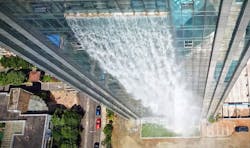A 350-foot waterfall splashes down from a skyscraper in China
While other buildings around the world are concerned with being the tallest or the most geometrically interesting, a 397-foot-tall building in China decided to create a sui generis feature to set itself apart from every other building in the world: a 350-foot waterfall.
The 397-foot-tall Liebian Building, located in Guiyang, China, uses four 185-kilowatt pumps to lift water from a four-story underground storage and drainage system up to the waterfall’s crest near the top of the building. The falling water, which is a combination of recycled tap water, rain water, and water from other channels, is collected in a tank at the base of the tower.
See Also: ‘Forest cities’ could help solve China’s air pollution problem
The waterfall is a sight to behold, but it isn’t something residents should get used to seeing every day. In order to run the waterfall for just one hour it costs about $117 in electricity, so it will only be turned on for special occasions in spurts of 10 to 20 minutes at a time.
Guizhou Ludiya Property Management Co. manages the waterfall and hopes it will become a popular tourist attraction in the city’s central business district.
